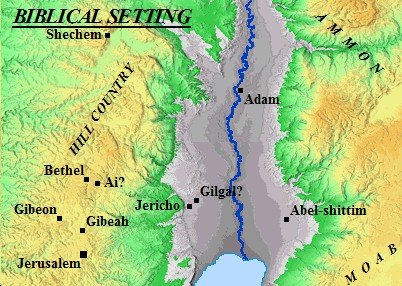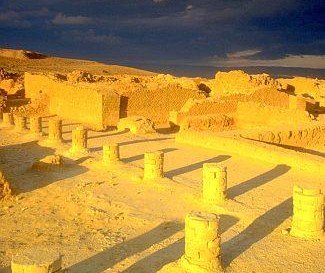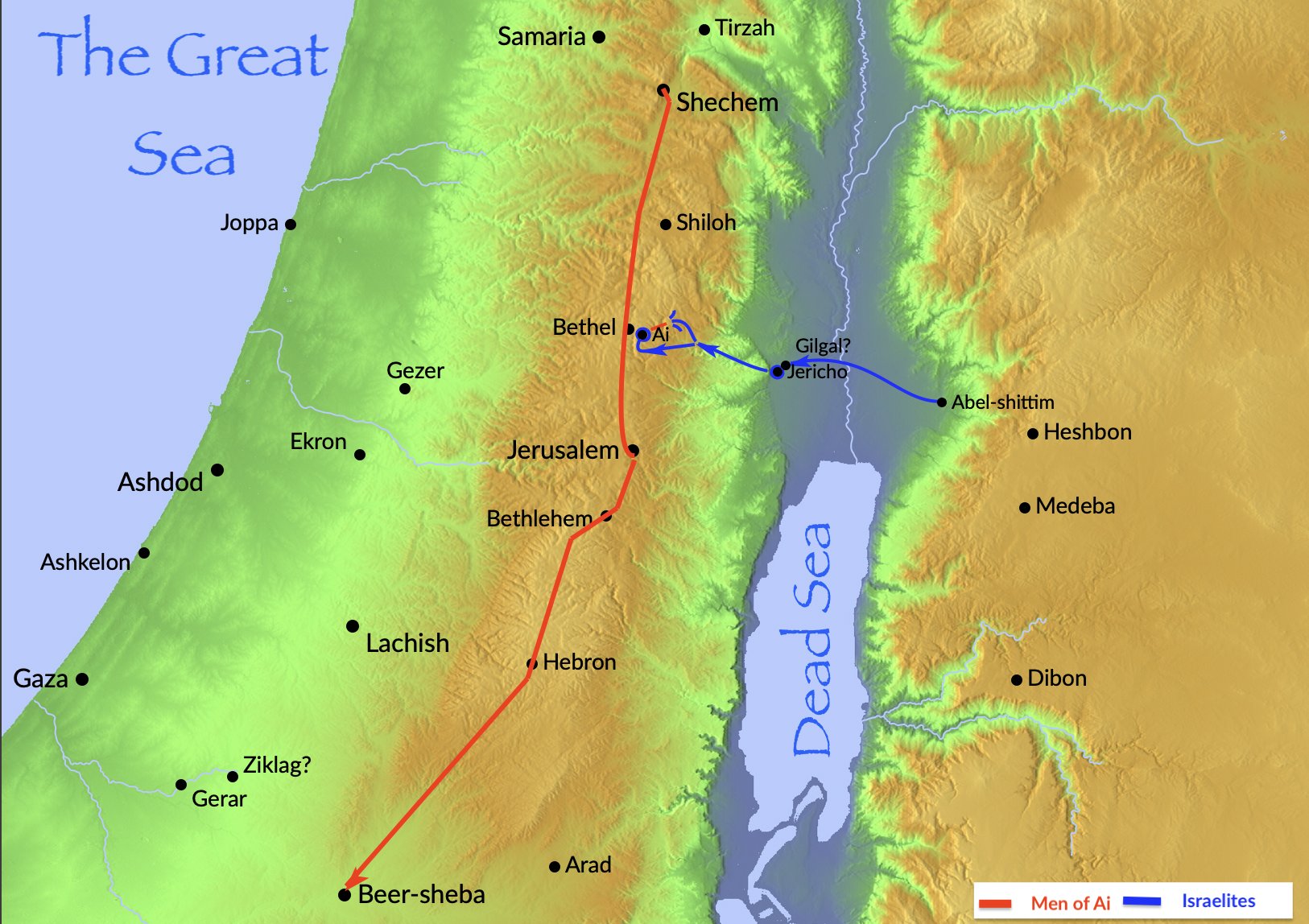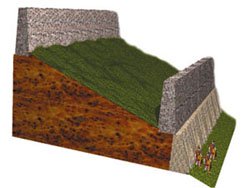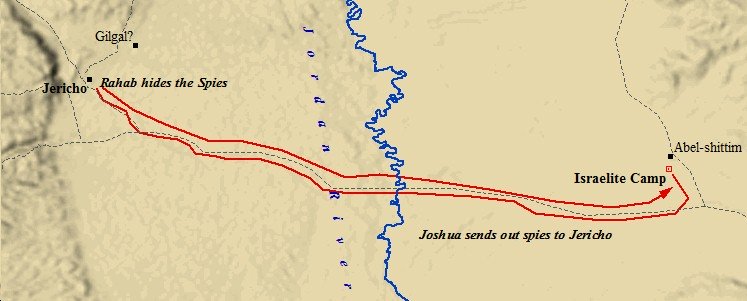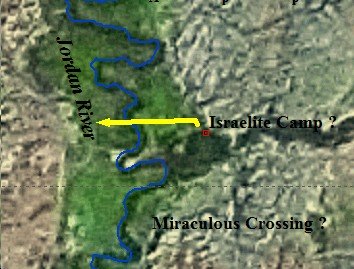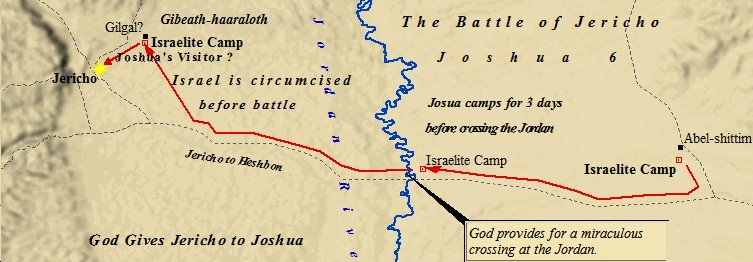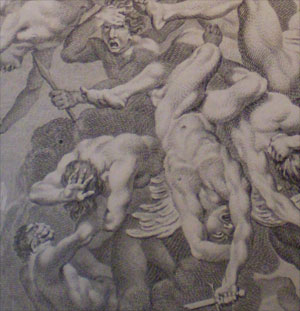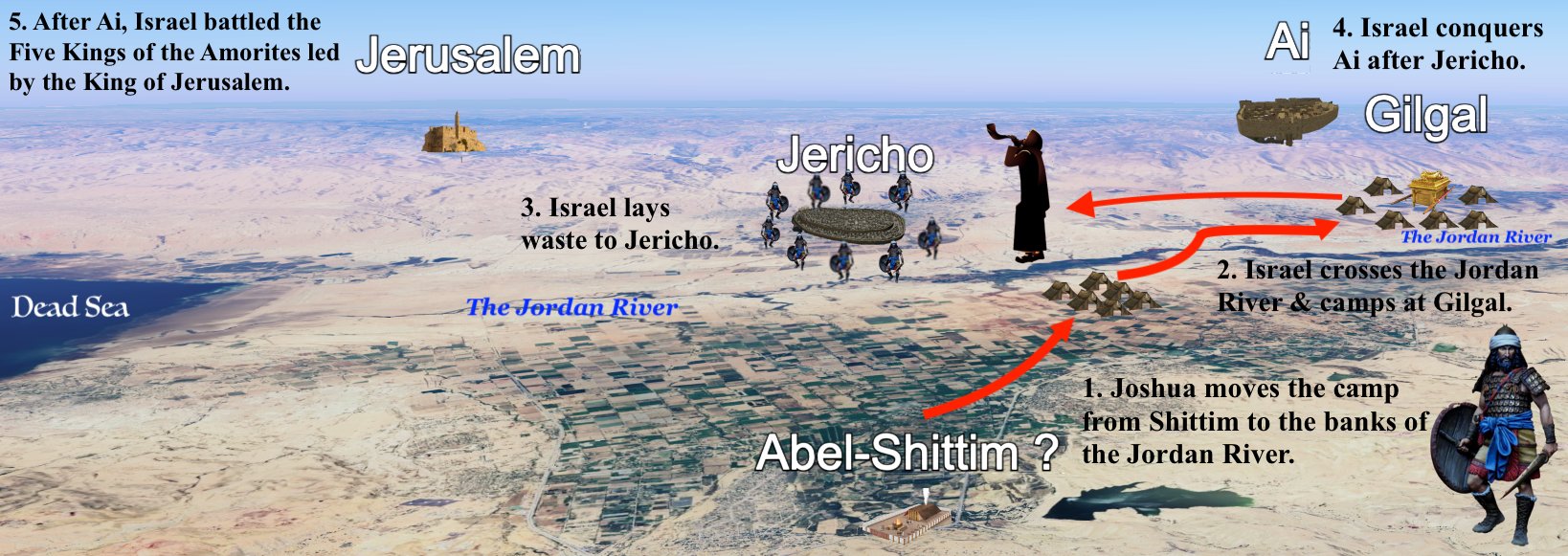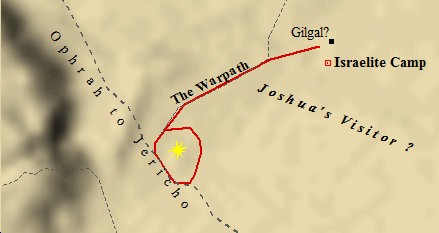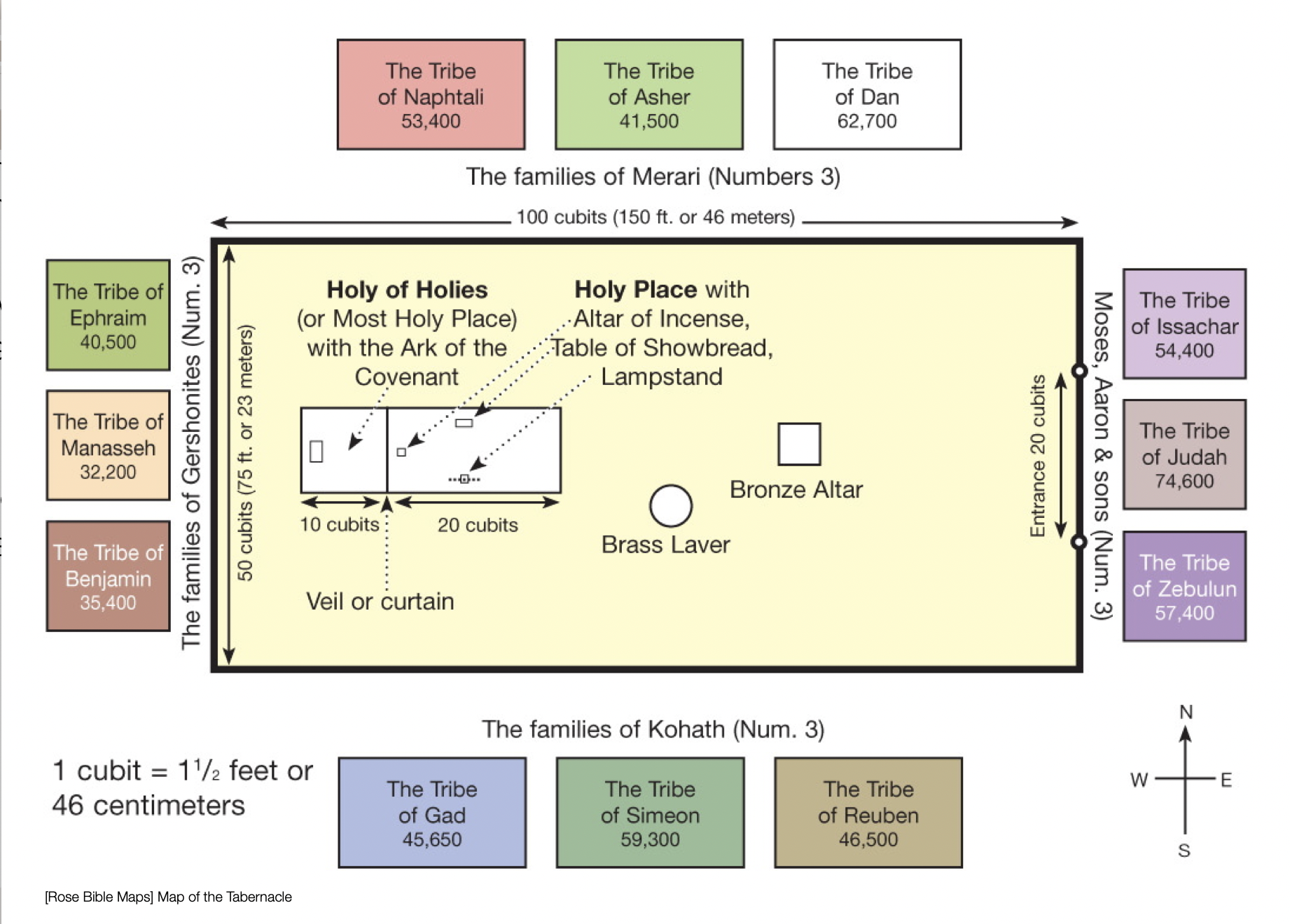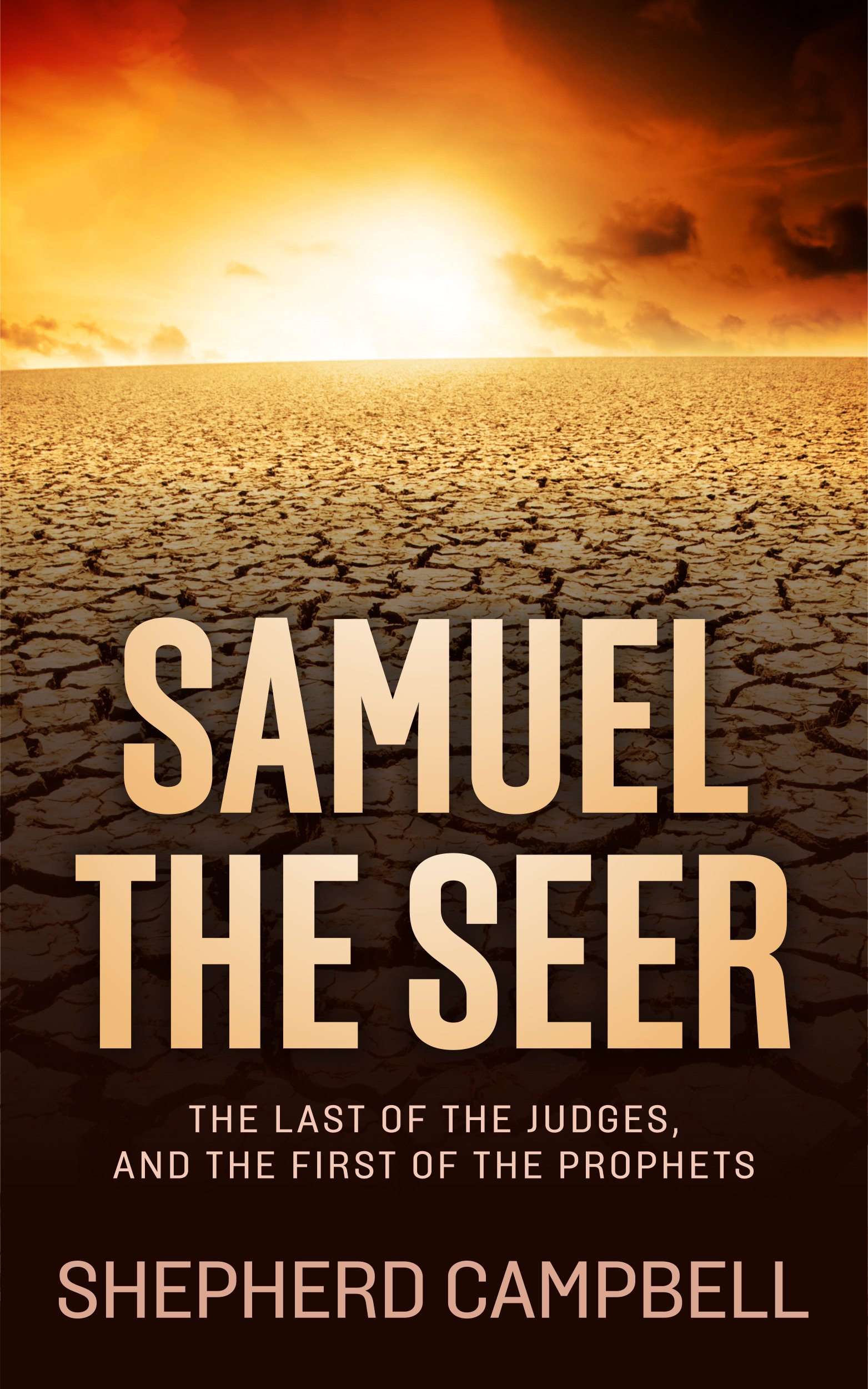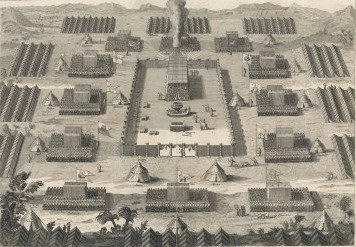VISIT OUR FACEBOOK PAGE!
The Battle of Jericho
The Battle of Jericho - Joshua 2-6
The Biblical account of the battle of Jericho begins in Joshua chapter 2, when Joshua sends out spies into ancient Jericho.
THE SETTING
The Bible says that Joshua and the Israelites were encamped at Shittim, and the spies were sent out from this town. Shittim lies approximately 10 miles (16km) east of the River Jordan, and approximately 15 miles (24km) east of Jericho. The Bible lists the fighting men of Israel at 40,000 (Josh. 4:13). However, the number of troops involved in the battle of Jericho is another controversy.
This controversy centers around the Hebrew word Eleph, which is usually translated as "thousand". However, the word has had a number of different meanings and uses throughout its history. ELEPH was originally connected to "head of cattle", signifying its application to denote a unit. In the sense of a head of cattle, eleph signifies a population unit important to an agricultural based society.
ELEPH was also used to describe the quota of men a village, or clan, was required to produce for the military. Originally this quota was a very small number, and ELEPH was used to denote that number of men required. Finally, the word evolved into a technical term used to describe a military unit of significant size.
Battle of Jericho Contents
|
Click on the link to view each section of THE BATTLE OF JERICHO |
Concerning the battle of Jericho, the word ELEPH is translated as "thousand". This leads to the number of 40,000 fighting men. Critics of this interpretation claim it should be translated as a military unit, which though significant in size was not literally 40,000 fighting men.
If the number 40,000 fighting men is taken as the original intent of the author, then the number of Israelites coming out of Egypt would have numbered between 2 million to 2.5 million men, women, and children. This would have not counted the amount of livestock and other people of different nations not included among the number of Israelites. Exodus makes it clear it was a mixed multitude that left Egypt - though overwhelmingly Israelite in nature, and an Israelite event. Some of these men from the mixed multitude would have participated on the Israelite side in the battle of Jericho.
However, if one allows for an error in copying, and a misinterpretation of the word ELEPH, then the number of fighting men in Israel and the population of ancient Israel itsel is more manageable. Regardless, the battle of Jericho involved thousands of people. Without going into great detail, proponents of this mistranslated/misinterpreted meaning of ELEPH theory have estimated the number of fighting men in Israel was actually 5,000 to 8,000 men.
Following this line of thought, the total population at the battle of Jericho is numbered from 20,000 to 40,000 men, women, and children - Israelites only. Evidence suggests that the Exodus was a heterogeneous mix of peoples, as mentioned above. People not of Israelite blood would not have been counted among the Israelites, though they were part of the group. Rahab and her household became part of this group. The actual number of people traveling, thus, would have been larger than just the number of Israelites.
|
The number in the thousands, rather than millions seems to fit ancient records of other countries. For
example, at the height of the Egyptian empire the standing ancient
Egyptian army numbered 20,000 fighting men. Yet, one could counter this argument with the argument that Pharaoh would not have feared 8,000 fighting slaves nearly as much as millions of rapidly producing slaves. In any case, the King of Jericho would have noticed the mass of
people encamped opposite the Jordan. |
Jericho exerted a mighty influence in the region. This influence would have easily spread the approximately 15 or so miles eastward across the Jordan River to where the Israelite camp was situated; and eastward from there into the plains of Moab. As the marauding Israelite nation approached Jericho, word would have traveled ahead of them warning of their imminent arrival. Rumors of their previous miraculous victories would've spread quickly through the Ancient Near East. Peoples from miles around would have fled to the city of Jericho for protection from these mysterious people and their powerful, yet invisible, God. The imminent battle of Jericho loomed over the region like a storm cloud.
Though small in diameter Jericho possessed extremely heavy fortifications and could have easily survived a siege of one year or more. Local village residents fared a much better chance of survival by fleeing to the protection found behind the walls of Jericho. The battle of Jericho would have influenced the entire region's economy and political stability. It lie at the doorway to Canaan, and it is most certain the Canaanite kings were taking notice.
JOSHUA'S SPIES - Israel's First Mossad
Like any good commander, Joshua first sought information on his target. As he had been one of Moses' spies into Canaan decades earlier, Joshua was well-trained in the art of intelligence gathering. He organized spies to scout Jericho's defenses. As the spies stealthily crept into ancient Jericho, they entered the house of a prostitute named Rahab (2:1). Jericho apparently possessed keen counter-intelligence operatives. Scripture reveals the king of Jericho became aware of the spies presence at Rahab's house. Scripture is silent as to how the king of Jericho became aware of their presence, but he sought to capture them and certainly torture them for intelligence before killing them.
He takes some of his men and confronts Rahab as to the Israelite spies whereabouts.
Joshua 2:4-5
"But the woman had taken the two men and hidden them, and she said, 'Yes, the men came to me, but I did not know where they were from. And it came about, when it was time to shut the gate, at dark, that the men went out; I do not know where the men went. Pursue them quickly, for you will overtake them."
Rahab reported that the men had left before the city gates had
closed, and then sent the King and his men on a wild goose chase. In
truth, she had hid them on the roof of her house (2:2-7). Rahab seemed to sense the outcome of the pending battle of
Jericho in advance. She chose to side with the Israelite spies, certain Israel would gain victory despite Jericho's massive walls and impressive ability to withstand sieges.
After she deceived the King, Rahab retrieved the spies and pleaded with them to spare her and her family in the upcoming battle of Jericho. The two spies agree to her request.
They tell her to hang a scarlet chord outside of her window identifying her house, thus, enabling the Israelite army to spare those inside. After they bargain for her safety, she then lowered the spies out of her window to the ground below. Rahab must have began immediate preparations for the upcoming battle of Jericho. Joshua 2:15 will prove to be a truly remarkable verse. It reads:
"So she let them down by a rope through the window, for the house she lived in was part of the city wall."
The spies then returned to Joshua and reported all that had happened. Joshua, satisfied with their report, moved the Israelite camp from Shittim to the edge of the Jordan River, where they encamped before crossing (3:1). The Bible tells us they spent 3 days at this campsite before the battle of Jericho. Joshua received more instruction from the Lord in regards to the impending invasion and how it would occur. He sent the officers throughout the camp instructing the people as to what was about to happen.
Joshua 3:3-4 depicts the orders given to the people:
Joshua 3:15 states that the Jordan was at flood stage, as it remained so throughout the time of the harvest. This meant the waters were very high, nearly overflowing the banks, and moving rapidly. The Jordan River in this condition was deep and the water fast. Crossing on foot was nearly impossible and very dangerous. It would have been unthinkable for the young and elderly.
As the Ark of the Covenant and the priests carrying it touched the fast-moving and flood-high waters of the Jordan River, God provided a miracle which would have been visible to everybody in the region.
Joshua 3:16
"that the waters which were flowing down from above stood and rose up in one heap, a great distance away at Adam, the city that is beside Zarethan; and those which were flowing down toward the sea of the Arabah, the Salt Sea, were completely cut off. So the people crossed opposite Jericho."
Much like He did with the Red (or Reed) Sea out of Egypt, God again stopped the waters for His people. Outside of the walls of Jericho and on the eastern banks of the Jordan River God demonstrated to the entire nation of Israel (and Jericho) that He was with Joshua, just as He had been with Moses. The high and fast flood waters of the Jordan River, impassable to man, mattered not to Yahweh. He simply stopped them up.
Imagine the shock from within the city of Jericho as they witnessed the Jordan River stop flowing and the waters gathering into a large heap several miles away. If nature was no match for this powerful Israelite God, then Jericho's massive walls would provide no protection either. As the hearts of Israel rose up in gratitude, the hearts of Jericho melted in fear.
After Israel crossed the muddied river bottom of the Jordan, Joshua chose twelve men to erect twelve stones in the middle of the river bottom to memorialize the event. The twelve stones apparently stood for quite some time afterward as a sign of God's provision. Once Joshua had finished the monument, God gave him further orders. The Israelites pitched camp and the men were circumcised. God had tested them, and their obedience led God to "roll away the reproach of Egypt" (5:9), a consequence of the previous generation's disobedience in the desert.
The Israelites were circumcised at "Gibeath-haaraloth", or, "the hill of foreskins". God's people were now in full compliance with His decrees. They were sanctified and in accordance with the Law. They were now ready for battle. The place became known as Gilgal; "on the eastern border of Jericho. (4:19)". In Joshua 5:10-12 the Israelites celebrated the Passover - just as they did on the eve of leaving Egypt four decades earlier.
The Bible tells us on the fourteenth day of the month they celebrated the Passover. Their celebration must have seemed eerily strange from on top the towering walls of Jericho. Why would this nation try to topple such massive and impenetrable walls? On the fifteenth day, Israel ate from the land of Canaan. On the sixteenth day, for the first time in forty years, the manna did not appear.
God had cut off the provision of manna for now they ate "of the produce of the land of Canaan". As God had delivered them out of the land of Egypt, He was now going to deliver them into the land of Canaan. Joshua 5:13-15 records an interesting encounter.
"Now, when Joshua was near Jericho, he looked up and saw a man standing in front of him with a drawn sword in his hand.Joshua went up to him and asked, 'Are you for us, or for our enemies?' 'Neither,' he replied, 'but as commander of the army of the Lord I have now come.' Then Joshua fell face down to the ground in reverence and asked him, 'What message does my Lord have for his servant?' The commander of the Lord's army replied, 'Take off your sandals, for the place where you are standing is holy.' And Joshua did so."
The Bible doesn't say what Joshua was doing. We are told he was "near Jericho", and nothing more. Perhaps he had finished walking through camp, checking on the people and supplies. He was aware the battle of Jericho was days, if not hours, away and wanted to make last minute preparations. Perhaps he was scouting the countryside, looking for patrols or weaknesses in the city's defense. Maybe he had been scouting for potential ambush sites. Maybe Joshua had been in prayer with the Lord. YAHWEH'S strategy was the key to victory in the battle of Jericho.
Suddenly a soldier appeared in front of Joshua. The appearance of this warrior was sudden and must've caught Joshua off-guard. Joshua did not recognize the man's uniform as either one of his or that of the enemy. He only knew the mystery warrior had a drawn sword in his hand. It is interesting that Joshua's reaction was not one of alarm, but rather curiosity. He asked the sudden visitor which side he was on. The soldier answered, "Neither..". He was the commander of the army of the Lord, perhaps suggestive of the archangel Michael.
Why would Michael be a strong candidate for the identity of this angel-warrior? Jude 9 mentions that the archangel Michael had disputed with the devil himself over the body of Moses. That was probably not the first time Michael and Lucifer had squared off against each other.
Michael is also mentioned in Daniel 10:13,21 & 12:1 as the prince of Israel who stands against forces of evil on behalf of Israel. Michael is also associated with Christ's second coming in 1 Thess. 4:16. It is also Michael who battles the fallen Watchers in the
book of Enoch
, again per God's divine instructions. The archangel Michael, according to Daniel 12:1, is "the great prince who stands guard over the sons of your people". He is the Protector of Israel.
Leading the Israelites in the battle of Jericho would certainly fit a mission Michael would be assigned. Michael's sole concern are his orders from God. The battle of Jericho is not man's fight, but God's. Thus Michael was right in his words to Joshua. He stood not for Israel nor for Jericho - but for God Almighty only. In fact, it is not too presumptuous, based on the Biblical evidence and context, to presume Michael would've led the entire invasion of Canaan on behalf of Yahweh.
The Lord then commanded Joshua as to the mechanics of the invasion. The "armed guard" (6:9) was to march first in line. They were followed by seven priests, carrying "trumpets of rams' horns" (6:4). These trumpets were blown continuously throughout the march around the walls of Jericho. The priests responsible for the ark of the covenant followed behind, with the "rear guard" (6:9) behind them. The battle of Jericho was a very structured invasion, and Joshua must follow precisely God's detailed orders.
Scripture is not exactly clear as to the rest of the procession, but it is common belief the rest of the Israelites fell in behind the rear guard Joshua was very precise in his instructions to the Israelites, just as God had been precise with him. Their role in the battle of Jericho was to march in procession once around the city, one time per day. They were to do this for six consecutive days, with the trumpets blowing continuously as they marched.
The seventh day would be different. Joshua instructed the people to march in silence.
"Do not give a war cry, do not raise your voices, do not say a word until the day I tell you to shout. Then shout!"
Scripture records that on the seventh day the Israelites:
"got up at daybreak, and marched around the city seven times in the same manner, except that on that day they circled the city seven times." (6:15)
Joshua had been very clear in his earlier instructions. After the seventh time they marched around the walls of Jericho, after the trumpet blasted, only then would Joshua give the order, and only then were the people to give a war cry. God would then tumble the walls of Jericho and give the city to His people. It was as simple as that. The battle of Jericho was to be God's battle all the way. All He required was faithful obedience.
Joshua issued orders that nothing was to be touched, or taken, except the things that had been devoted to the Lord. All people, men, women and children, young, and old, were to be killed.
The silver, gold, bronze and iron were to go into the Lord's treasury. The devastation was to be complete. Only Rahab and all who were under her roof were to be spared. On the seventh day, after the seventh time around the walls of Jericho, Joshua gave the command and the Israelites gave a shout.
The Bible says, "the wall fell down flat" . The Hebrew suggests that the city walls of Jericho fell beneath themselves. The walls of Jericho fall upon themselves. In fact, excavations have shown that the bricks from the collapsed walls of Jericho formed a ramp against the retaining wall.
The Israelites simply; "went up into the city, every man before himself" (6:20).
The destruction following the battle of Jericho was complete.
The Israelite army destroyed every living thing. They killed every man,
woman and child. They burnt the entire city, save for the Lord's
treasure. They displayed their extraordinary discipline as a complete army.
For an army to completely destroy Jericho as Israel did requires
remarkable coherence and synchronization. Israel possessed a well
trained, highly disciplined, and fast attacking army. The battle of Jericho was completely one-sided.
Joshua 6:21
"And they utterly destroyed everything in the city, both mand and woman, young and old, and ox and sheep and donkey, with the edge of the sword."
In Joshua 6:24, they complete the destruction by burning Jericho.
"And they burned the city with fire, and all that was in it. Only the silver and gold and articles of bronze and iron, they put into the treasury of the house of the Lord."
To conclude the decisive battle of Jericho, Joshua cast a curse on the ancient city in the waning verses of chapter 6. This curse concluded the Biblical account of Jericho's role in the conquest of the Promised Land.
"Cursed before the Lord is the man who rises up and builds
this city Jericho; with the loss of his first-born he shall lay its
foundation, and with the loss of his youngest son he shall set up its
gates."
SHARE YOUR THOUGHTS ON THE BATTLE OF JERICHO
Do you study ancient military battles? What are your thoughts about
Joshua? Click to give your insight, thoughts, comments, and questions
on this most remarkable Israelite victory
Back to Top of Battle of Jericho
Back to Jericho Israel
Back to Home Page
Recent Articles
-
The Tabernacle
Feb 27, 25 04:47 PM
The Tabernacle was where Yahweh met with his people before the First Temple was built. It was also called the Tent of Meeting. -
The Tabernacle of Moses
Feb 19, 25 09:50 AM
The tabernacle of Moses was built by Moses, per instruction from God, during the Exodus out of Egypt. It represented God's presence amongst His people. -
The Ark of the Covenant
Feb 19, 25 09:46 AM
The Ark of the Covenant is one of the most mystifying objects in all of human history. It's power was so great that Israel often carried it to the front lines.
SAMUEL the SEER
Now Available in Print & eBook on Amazon!!
POPULAR TOPICS
Learn more about these popular topics below. The Bible is full of fascinating stories, characters and mysteries!
BIBLE MAPS
Explore the land of the Old Testament! View these maps of the Bible.
